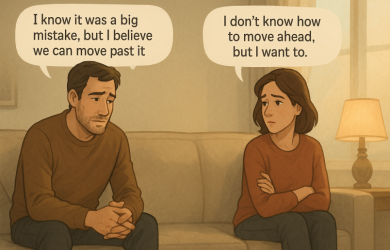8 Infidelity Recovery Stages: 5 Practical Tips to Heal

Unlock Daily 30-Sec Tips for a Happier Relationship
👉 Subscribe FREEKey Takeaways
Marriage.com AI Quick Summary
Infidelity recovery stages are a form of therapy designed to help you work through the emotional trauma following an affair in your relationship.
Emotions can overwhelm you with insecurities, worry, anxiety, pain, and distrust following infidelity. These can be difficult to work through on your own and may cause emotional damage for years to come.
Seeking professional counseling can greatly benefit you either as a single or as a couple. The infidelity recovery stages are designed to work through your issues, reconnect with yourself or your partner, create a timeline, and create a plan for how to move forward.
This article looks at the infidelity recovery stages and how they can help you.
What is infidelity?
Infidelity within a relationship is when a partner engages in sexual or physical intimacy outside the bounds of their relationship. It is seen as a betrayal of trust that exists within a relationship and can negatively impact the relationship upon discovery.
Some relationships fall apart due to infinity, while other couples go through the infidelity recovery stages to address their problems constructively and healthily.
8 infidelity recovery stages
Like many other forms of marriage counseling, infidelity therapy is done in stages designed to get to know you and your partner better. This will help your therapist understand your circumstances and allow you to get to know yourself and your partner’s needs and wants differently.
Here are the common stages of infidelity recovery therapy.
1. Discovery and acceptance
Infidelity recovery stages begin with accepting the betrayal that has taken place and grieving what has been lost.
It may require you to go deeply into detail for both parties to be completely honest with one another, not only about the affair but what may have led to the breakdown in love and communication between the couple.
Research shows the power of acceptance. Acceptance may be a very painful step in the infidelity recovery stages, but it is necessary.
2. Rediscovering your relationship
How to get over the infidelity pain?
If you aim to stay together, one stage of recovery will be rediscovering yourself and your partner. After an affair, it isn’t easy to resume your former relationship as it once was. Building a new one together is one of the important stages of recovery from infidelity.
Your therapist will help give you the tools to put the past behind you and refocus on rediscovering the good in your relationship.
3. Uncovering the deeper issues
Stages of coping with infidelity include getting past the superficial concerns and addressing the unresolved deeper issues within the relationship that may have caused the infidelity.
Many affairs happen for no reason, whereas others can come down to being a product of depression, lack of love or affection in a current relationship, substance abuse, or past trauma.
If your therapist detects any of these issues to be a core reason for the unhappiness in the relationship, they will begin to address this as part of the treatment plan.
4. Addressing and managing pain
Since a therapist is a trained professional, they can help you address any pain and hurt you are feeling. They may even detect symptoms and side effects caused by the affair plaguing you, such as those related to PTSD or trauma.
A therapist can also help you with emotional pain management and help you work through the heartache you are feeling.
5. Creating a timeline
Some infidelity recovery stages include building a timeline. During this stage, you will be given a timeline, say a month, to figure out whether you want to stay together or break up. Use this stage to build a true pro/con list of whether staying together would benefit you.
Stages of affair recovery can become easier if you take the time to create a proper timeline for you and the relationship. It gives a much-needed structure to your partner’s infidelity.
It is important to be open and honest with yourself and your partner during this time and never to rush your decision. By the end of the month, you will tell your therapist whether you are staying together or breaking up.
6. Forgiveness and the healing process
Affairs are painful experiences for both parties involved. As a result of infidelity, guilt, distrust, and anger may flow into your relationship even if you try your hardest to forgive your partner. These conflicting emotions can be difficult to handle.
Stages of healing after infidelity are incomplete without acknowledging the power of forgiveness in infidelity.
Your therapist can help you through the healing process. This includes creating a plan of action to reconnect as romantic partners and friends, rebuild trust with one another, and recommit to a seemingly broken relationship.
7. Seek advice if you have children
If you have children together, your therapist will likely include that aspect of your relationship in your counseling session at one point or another.
A therapist will listen to your concerns regarding your children, the affair, and your choice of whether or not to stay together and will be able to instruct you on the best way to co-parent while going through this difficult time.
8. How to proceed
At the end of your chosen timeline, you will have to decide whether you have decided to stay together.
Upon reaching the end of the stipulated timeline, you may continue couples therapy if you are still ambivalent about your relationship status or move on to individualized therapy sessions to help you get to know yourself better.
Whatever choice you make, your therapist can help you chart a course on how to proceed with your lives, either together or separately. This can allow you to continue living your life and making progress toward your healthy management of the stages of recovery after an affair.
5 key steps to survive infidelity
No matter what form it takes, cheating is one of the most painful experiences you can go through. Therefore, this process can be done alone to work through your emotions or with a partner as a form of online marriage counseling.
If you are a couple, this process can help you learn how to move forward together or separately.
If you have left your partner, the infidelity recovery stages can still help you deal with the backlash of the affair and the issues it may have caused in your life, such as feelings of distrust, betrayal, and doubt.
Here are some things that can help you survive infidelity:
- Face the reality of infidelity, acknowledging the pain and betrayal without suppressing your emotions.
- Foster honest and open dialogue with your partner to understand motivations, express feelings, and rebuild trust.
- Consider couples therapy or counseling to navigate complex emotions and gain guidance on rebuilding the relationship.
- Clearly define and communicate boundaries to rebuild trust and prevent future breaches of commitment.
- Prioritize self-care, engage in activities that bring personal growth, and seek support from friends or a support network to navigate the healing process.
No matter your circumstances, you will find it helpful to have a professional as you work through the affair. However, you can look at some key steps to recovering from infidelity in the meantime.
Watch this video if you are trying to decide whether you should stay or go after your partner has cheated on you:
Some commonly asked questions
Recovering from an affair can be extremely painful for the partner cheated on and the relationship overall. It can give rise to many questions that cause confusion and insecurities. Here are a few of them.
-
Does the pain of infidelity ever go away?
The pain of infidelity can be hard to deal with if you truly trusted your partner and were completely caught off-guard. However, taking time and allowing yourself to deal with things healthily can help you heal gradually.
-
How does infidelity affect a person?
Infidelity affects different people differently. A person whose partner has betrayed them might go through stress, anxiety, or depression. It may make them feel deeply insecure about their physical and emotional capabilities.
-
When should you walk away after infidelity?
When trust is irreparably shattered and efforts to rebuild consistently fail, it may be time to walk away. Prioritize your emotional well-being and recognize when the relationship is no longer healthy or fulfilling.
-
What hurts most about infidelity?
The deepest pain from infidelity often stems from the betrayal of trust, shattered expectations, and the emotional scars that linger, challenging the very foundation of the relationship.
Final takeaway
Infidelity can be difficult, but with some guidance, there can be a way to survive and heal from the pain caused by it. A therapist can guide this process by giving you healthy tools to manage the impact of the betrayal.
The ultimate goal of infidelity therapy is to learn to forgive. This healing path is not quick and comes in many stages, but the benefits far outweigh the difficulties. Couples or singles dealing with emotional turmoil due to an affair in their relationship will benefit greatly from counseling.
 Tips
Tips
Write your tip or submit a video tip
All tips are reviewed before the publishing.
Share this article on
Want to have a happier, healthier marriage?
If you feel disconnected or frustrated about the state of your marriage but want to avoid separation and/or divorce, the marriage.com course meant for married couples is an excellent resource to help you overcome the most challenging aspects of being married.
Recent Articles
Related Quizzes
Unlock Daily 30-Sec Tips for a Happier, Healthier Relationship
👉 Subscribe FREE on YouTube We'd love your feedback!
We'd love your feedback!
 Expert Q&A
Expert Q&A
Ask your question related to this topic & get the support you deserve from experts.



















 Thanks for your feedback!
Thanks for your feedback!